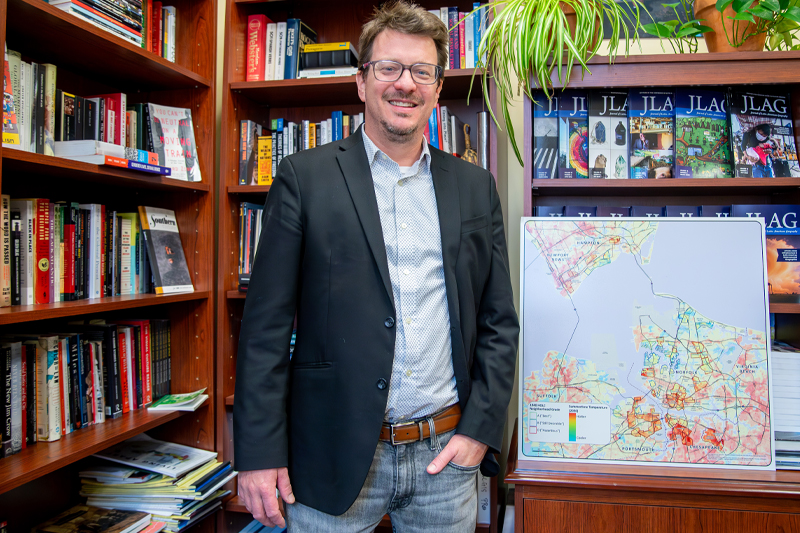
Read time:
It’s not that Dr. John Finn wasn’t excited about being selected for the Commonwealth’s highest teaching honor. He simply didn’t know–at least not right away. The chair of the Department of Sociology, Social Work and Anthropology was out of the country, this time in Cuba. It’s one of the many places Finn’s research has taken him over the years in an effort to understand the social, cultural, economic and political processes that shape our world—a quest that ultimately brought him this distinguished recognition.
“I was completely off the grid, in Cuba, when the announcement came out,” said Finn. “It was amazing news to receive when I reconnected to the world a couple days later. It's a huge honor to be selected for this award. I'm actually quite shocked, given the high caliber of faculty both at CNU and around the state. I'm feeling really very humbled.”
The State Council of Higher Education for Virginia (SCHEV) recognized Finn’s commitment to education by naming him one of the recipients of the 2024 Outstanding Faculty Awards, a coveted honor that goes to a handful of faculty of Virginia schools who have risen to the top. Finn’s CNU colleague, Chemistry professor Tarek Abdel-Fattah was also selected. Each recipient will receive a $7500 gift from the Dominion Energy Charitable Foundation during a ceremony in Richmond in March.
Finn’s research examines racial capitalism, critical landscape studies and environmental justice focused on providing a better understanding of the ongoing economic, environmental and health impacts of persistent racial segregation. For the last four years, he has directed a project that has garnered widespread public interest, entitled, “Living Apart: Geography of Segregation in the 21st Century.” Featured in galleries at both the Virginia Museum of Contemporary Art, the James Wise gallery at Norfolk State University and the Mary M. Torggler Fine Arts Center, “Living Apart” uses oral history interviews, experimental photographic methodologies, historical and archival research and interactive mapping to trace the history of how overtly discriminatory federal housing policy created structures of racialized inequality in housing that continues to produce and perpetuate profoundly unequal urban and environmental outcomes.
“One of the main aims of my public-facing work is to help give people a framework for understanding how the deep racial inequality that is present in our country is not accidental or coincidental, but rather produced through all kinds of societal structures and practices,” Finn said. “And while sometimes this work is challenging and even depressing, I try to see things optimistically: If the inequality that is present in our society is not accidental, or a question of fate or coincidence, but rather created by specific actions and policies, that means that things could be different, that we can—and must!— find a pathway toward a more racially and environmentally just future. That's precisely where my commitment to public facing scholarship comes in.
”I get the sense that people are paying closer attention than ever to the ongoing, present-day impacts of the legacy of racial discrimination in the United States,” he said. “That's exactly what my research is about. At its core, my work seeks to better understand the ongoing economic, environmental, and health impacts of one particularly destructive part of our racial history - the history of racial segregation in the United States.”
Finn says he is deeply appreciative of all the support he’s received in his research and teaching career, and looks forward to carrying on work about which he feels so passionate.
“It is only through unearthing and truly contending with our history that we can see the oftentimes invisible forces that maintain and perpetuate our unequal reality,” said Finn. “The civil rights activist and writer James Baldwin wrote that ‘History is not the past. It is the present. We carry our history with us. We are our history.
“The fact that nominees are endorsed by students, our faculty colleagues, and the administration makes it all the more meaningful. I'm so appreciative of the support of my students, of my department, my faculty colleagues, and of CNU's administrative leadership, especially Dean Rizova, Provost Kidd, and Vice President Colvin, for all their support over the years,” said Finn. “I also want to mention that none of this work would be possible without the amazing support and participation of so many community partners and research participants.”